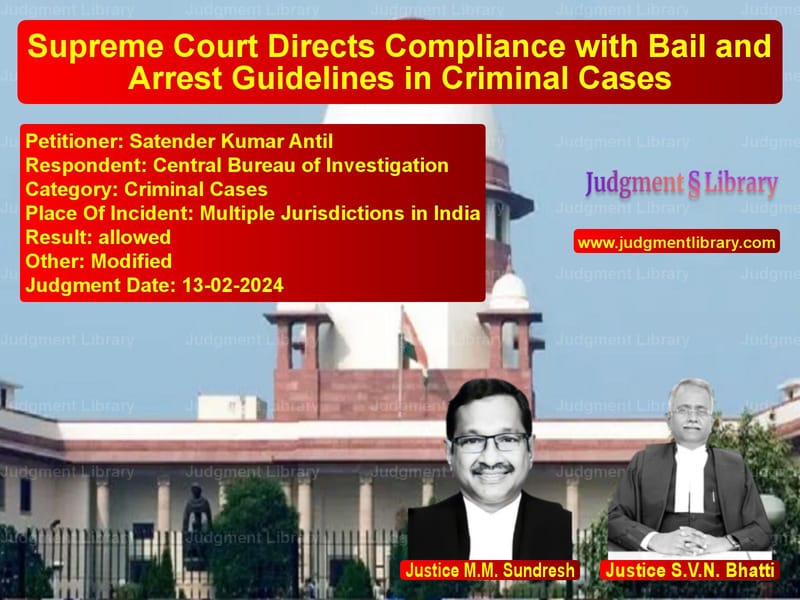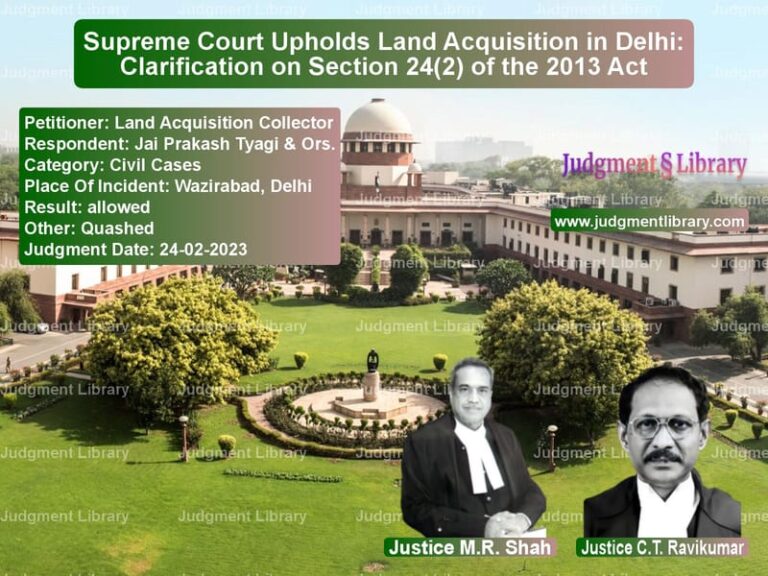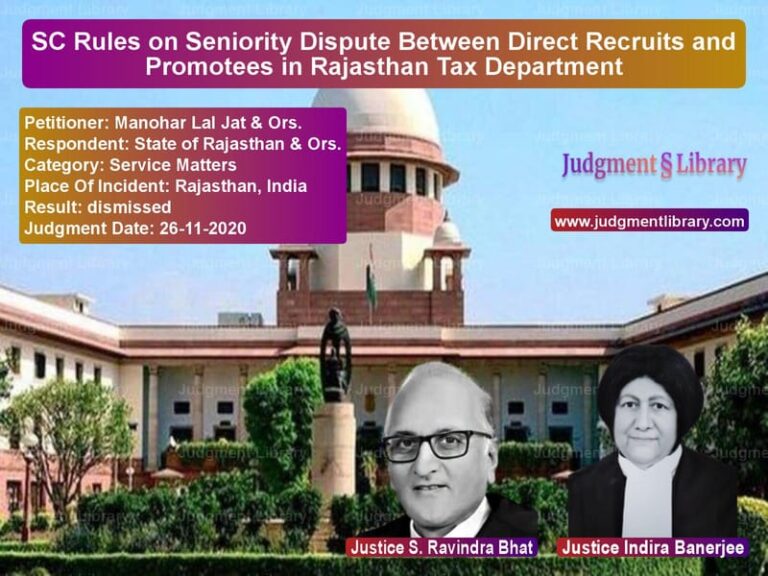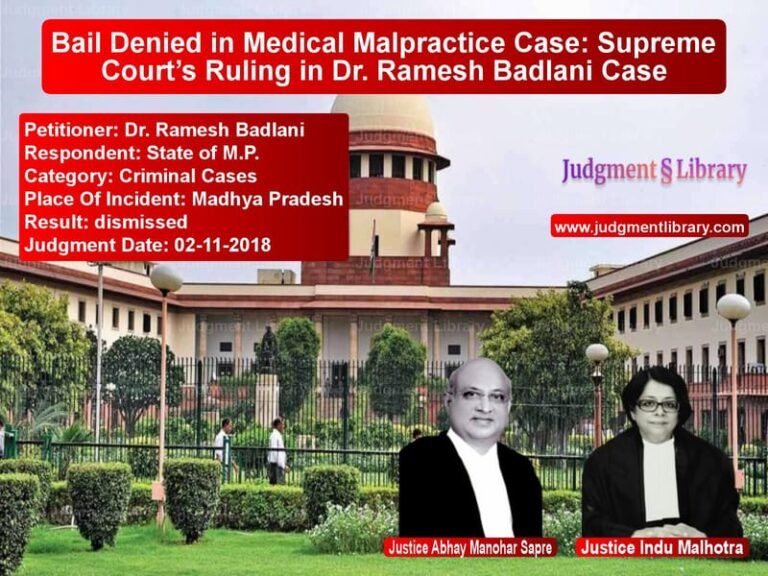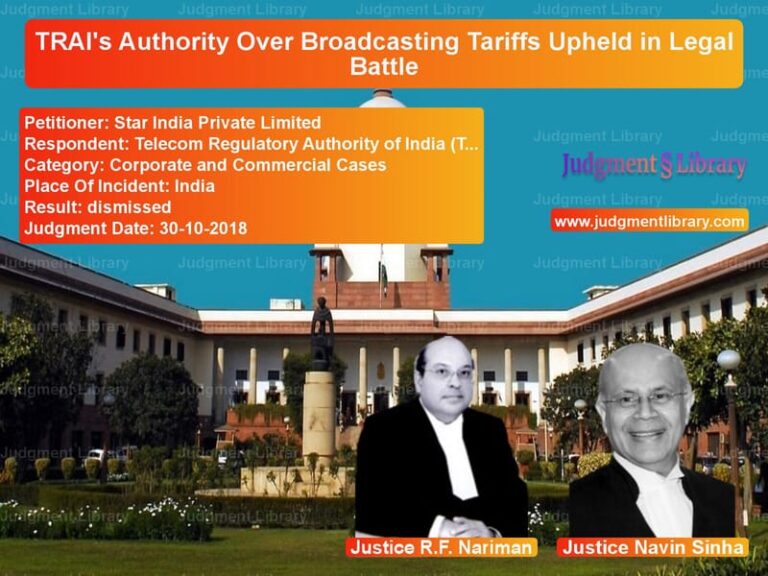Supreme Court Directs Compliance with Bail and Arrest Guidelines in Criminal Cases
The Supreme Court, in Satender Kumar Antil v. Central Bureau of Investigation, reiterated its stance on strict adherence to the procedural safeguards under Sections 41 and 41-A of the Criminal Procedure Code (CrPC) and the principles laid down in Arnesh Kumar v. State of Bihar. The Court issued comprehensive compliance directives for all States, Union Territories, and High Courts to ensure uniformity in granting bail and arrest procedures.
Background of the Case
The case originated from procedural lapses in arrest and bail grant across different jurisdictions. The petitioners contended that law enforcement authorities were not complying with the safeguards outlined in previous landmark rulings, leading to unnecessary arrests and prolonged incarcerations. The matter was heard along with multiple compliance affidavits filed by States, Union Territories, the Central Bureau of Investigation (CBI), and the National Legal Services Authority (NALSA).
Key Legal Issues
- Whether States and Union Territories were complying with procedural safeguards under Sections 41 and 41-A of CrPC.
- Whether undertrial prisoners were facing unnecessary delays due to failure in securing sureties despite being granted bail.
- Whether prosecutors were trained and equipped to apply the correct legal standards while arguing bail matters.
- Whether special courts were being established to expedite criminal trials.
Petitioner’s Arguments
The petitioner, through Amicus Curiae, argued:
- There was widespread non-compliance with Arnesh Kumar v. State of Bihar, which mandates that arrest should be an exception, not a rule.
- Many undertrial prisoners were unable to comply with bail conditions due to financial constraints, leading to unnecessary incarceration.
- Despite judicial directives, prosecutors were not consistently applying the principles of Satender Kumar Antil v. CBI in bail matters.
- Several States failed to establish additional Special Courts as per the requirement to fast-track criminal cases.
Respondent’s Arguments
The Central Bureau of Investigation and various States countered:
- Efforts were being made to ensure compliance, but logistical constraints prevented immediate implementation in all districts.
- Law enforcement agencies had started following the requirement under Sections 41 and 41-A of CrPC in most cases.
- Judicial academies had begun incorporating relevant Supreme Court judgments into their training modules.
- Some States had already set up additional Special Courts, and others were in the process of doing so.
Supreme Court’s Observations
The Bench, comprising Justices M.M. Sundresh and S.V.N. Bhatti, made significant observations:
- “It is imperative that the safeguards under Sections 41 and 41-A of CrPC are scrupulously followed to prevent unnecessary arrests.”
- “Special Courts must be set up expeditiously to ensure that cases do not remain pending indefinitely.”
- “NALSA and State Legal Services Authorities must ensure that prisoners who cannot afford sureties are assisted appropriately.”
- “All States must submit compliance affidavits detailing their progress in implementing these directives.”
Final Directives Issued
The Supreme Court issued the following compliance directives:
For States and Union Territories:
- Provide data on compliance with Sections 41 and 41-A of CrPC.
- Submit reports on actions taken against officers failing to follow procedural guidelines.
- Ensure Special Courts are established for expeditious trial of pending cases.
- Report the status of training programs for prosecutors regarding bail jurisprudence.
For High Courts:
- Monitor lower courts to ensure that unnecessary bail conditions are not imposed.
- Ensure that judicial officers adhere to bail timelines mandated by the Supreme Court.
- Include relevant judgments in judicial academy training programs.
For Investigating Agencies:
- Ensure that investigating officers follow the standard operating procedures (SOPs) outlined in previous rulings.
- Periodically update compliance status with the Supreme Court.
For NALSA:
- Identify undertrial prisoners who remain incarcerated due to inability to furnish sureties.
- Ensure that legal aid services assist prisoners in filing bail applications where required.
Key Takeaways
- All arrests in cognizable and non-bailable cases must adhere to Sections 41 and 41-A CrPC.
- Bail applications must be processed without unnecessary delays.
- Special Courts should be created where required to prevent case backlog.
- Legal aid must be provided to undertrial prisoners unable to afford sureties.
Impact of the Judgment
The ruling ensures that the rights of accused persons are safeguarded through proper implementation of procedural safeguards. The judgment will:
- Reduce instances of arbitrary arrest and prolonged detention.
- Ensure that investigating officers and prosecutors follow due process in criminal cases.
- Strengthen the role of legal aid institutions in facilitating bail applications.
- Improve efficiency in criminal case disposal through the establishment of Special Courts.
Conclusion
The Supreme Court’s decision in Satender Kumar Antil v. CBI establishes an important precedent in ensuring procedural compliance in criminal cases. By directing strict adherence to existing legal safeguards, the judgment protects individual rights while improving the efficiency of the justice system. The ruling mandates transparency, accountability, and adherence to due process in bail and arrest matters across all jurisdictions.
Petitioner Name: Satender Kumar Antil.Respondent Name: Central Bureau of Investigation.Judgment By: Justice M.M. Sundresh, Justice S.V.N. Bhatti.Place Of Incident: Multiple Jurisdictions in India.Judgment Date: 13-02-2024.
Don’t miss out on the full details! Download the complete judgment in PDF format below and gain valuable insights instantly!
Download Judgment: satender-kumar-antil-vs-central-bureau-of-in-supreme-court-of-india-judgment-dated-13-02-2024.pdf
Directly Download Judgment: Directly download this Judgment
See all petitions in Bail and Anticipatory Bail
See all petitions in Judgment by M.M. Sundresh
See all petitions in Judgment by S.V.N. Bhatti
See all petitions in allowed
See all petitions in Modified
See all petitions in supreme court of India judgments February 2024
See all petitions in 2024 judgments
See all posts in Criminal Cases Category
See all allowed petitions in Criminal Cases Category
See all Dismissed petitions in Criminal Cases Category
See all partially allowed petitions in Criminal Cases Category

